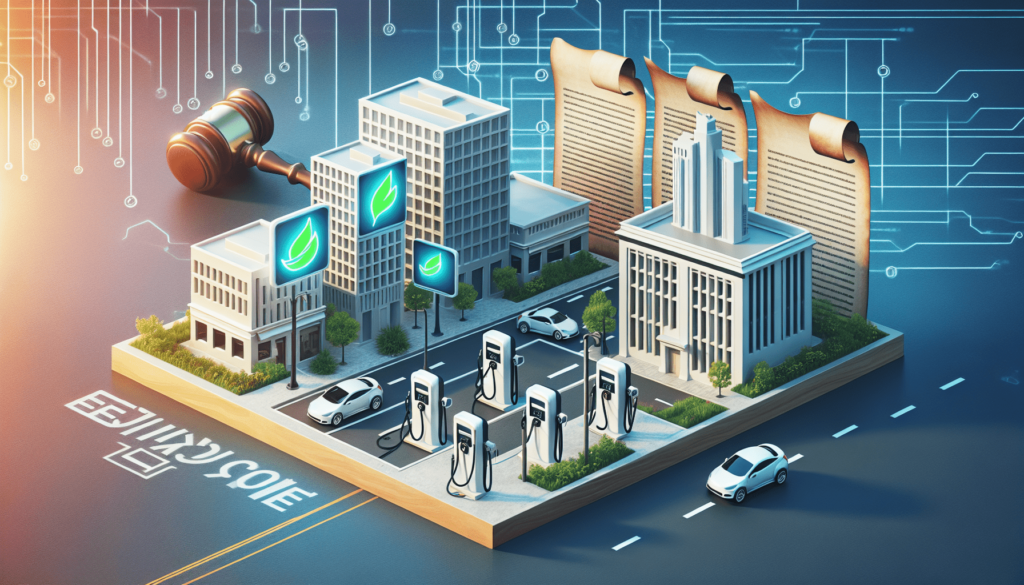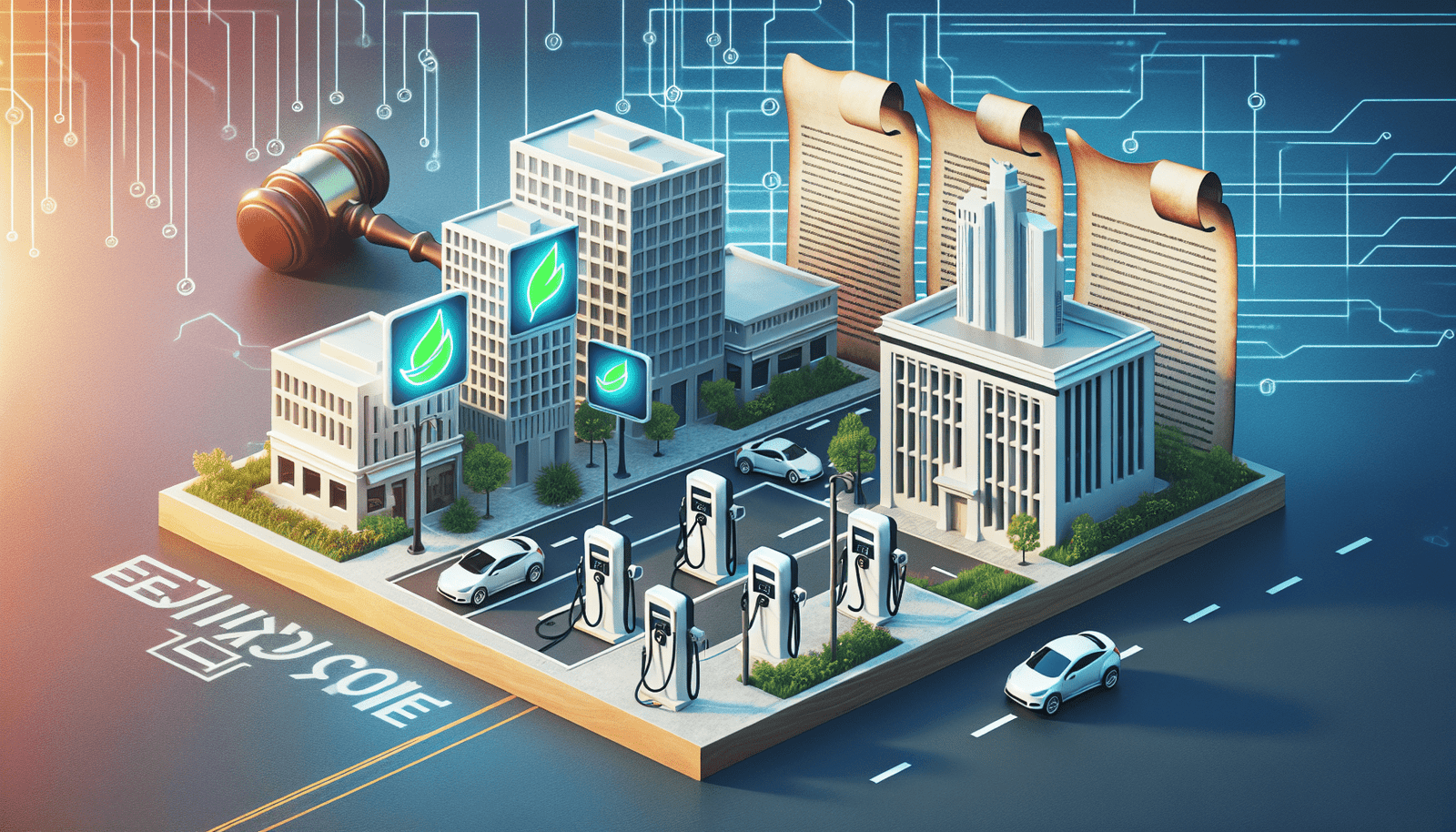In the rapidly advancing world of electric vehicles (EVs), it’s crucial to examine whether government policies effectively cater to the charging needs of businesses. As more and more companies adopt EVs as part of their sustainability strategies, the accessibility and availability of charging infrastructure become pivotal. This article explores the extent to which government policies acknowledge and address the pressing issue of electric vehicle charging for businesses, offering insights into the challenges faced and possible solutions. So, fasten your seatbelt and get ready to zoom into the world of government policies and EV charging for businesses!
Overview of Electric Vehicle Charging for Businesses
Electric vehicle (EV) charging infrastructure plays a crucial role in facilitating the transition to a cleaner and more sustainable transportation system. As more businesses recognize the benefits of electrifying their fleets and providing charging options for employees and customers, it becomes essential to have government policies in place to support this transition. This article will examine the importance of government policies, both at the national and local levels, in addressing the charging needs of businesses. It will also discuss the challenges faced by government policies and the collaboration required with the private sector to ensure the successful implementation of charging infrastructure. Finally, it will explore international examples and discuss the role of businesses in supporting the growth of EV charging infrastructure. With a comprehensive understanding of these factors, we can gain insights into the future outlook for electric vehicle charging and its impact on businesses.
Importance of Government Policies
Encouraging Transition to Electric Vehicles
Government policies play a pivotal role in encouraging businesses to transition to electric vehicles. By offering incentives and grants, governments can offset the high upfront costs associated with purchasing EVs and installing charging infrastructure. Additionally, by implementing measures such as zero-emission vehicle mandates or congestion charges, governments can create a favorable environment that drives businesses to adopt electric vehicles as a means of meeting sustainability targets and reducing harmful emissions.
Supporting Infrastructure Development
To ensure widespread adoption of electric vehicles, a robust charging infrastructure is indispensable. Government policies can support the development of charging infrastructure by providing funding for the installation of charging stations in strategic locations such as highways, public spaces, and commercial areas. These policies can also address the need for different types of chargers, including fast-charging stations, to cater to the diverse charging requirements of businesses.
Reducing Costs for Businesses
One of the key barriers to electric vehicle adoption for businesses is the cost involved in installing charging infrastructure. Government policies can help alleviate this burden by providing financial support, such as grants or tax incentives, to businesses that invest in charging infrastructure. Additionally, implementing time-of-use tariffs for electricity consumption can help businesses save on charging costs by incentivizing charging during off-peak hours when electricity rates are lower.
Addressing Charging Needs at Different Scales
Businesses have varying charging needs depending on their sizes and operational requirements. Large corporations with substantial vehicle fleets may require high-power charging stations and sophisticated management systems, while small and medium-sized enterprises (SMEs) may opt for more cost-effective solutions. Government policies need to address these diverse needs by offering incentives and technical support tailored to different business scales, ensuring that all businesses can access and benefit from electric vehicle charging infrastructure.

National Government Policies
Funding Electric Vehicle Infrastructure
National governments play a pivotal role in funding the development of electric vehicle infrastructure. By allocating budgets specifically for charging infrastructure projects, governments can incentivize public and private entities to collaborate in building a robust charging network. This funding can be used to support the installation of charging stations and invest in innovative technologies that enhance the efficiency and accessibility of charging infrastructure across the country.
Providing Grants and Incentives for Businesses
To encourage businesses to invest in charging infrastructure, national governments can provide grants and incentives. These financial incentives can offset the high costs of installation and equipment, making it more attractive for businesses to adopt electric vehicle charging solutions. Incentives can include grants, tax credits, or subsidized electricity rates for charging, effectively reducing the financial burden on businesses while promoting the growth of the charging infrastructure.
Setting Quality and Safety Standards
Ensuring the safety and reliability of charging infrastructure is essential for businesses and consumers alike. National governments can play a crucial role in establishing quality and safety standards for charging equipment, ensuring that businesses invest in reliable and certified charging solutions. By setting these standards, governments create a level playing field for charging equipment manufacturers, enhance consumer confidence, and protect businesses from potential risks associated with substandard equipment.
Integrating Electric Vehicle Charging in Building Codes
Another important aspect of government policies is integrating electric vehicle charging requirements into building codes and regulations. By mandating the inclusion of charging infrastructure in new commercial constructions and renovations, governments can ensure that businesses have the necessary infrastructure to support electric vehicle adoption. This integration not only helps overcome the hurdle of retrofitting existing buildings but also lays the foundation for a future in which electric vehicle charging becomes the norm rather than the exception.
Local Government Initiatives
Installing Charging Stations in Public Spaces
To address the needs of businesses, local governments can play a pivotal role in installing charging stations in public spaces. By strategically locating charging stations in areas with high commercial activity, such as shopping malls, office complexes, and public parking areas, local governments can ensure that businesses have access to convenient and reliable charging options. This initiative not only benefits businesses but also encourages individuals to transition to electric vehicles by providing charging infrastructure in easily accessible locations.
Offering Incentives for Businesses to Install Charging Infrastructure
Local governments can further support businesses by offering incentives to install charging infrastructure. This can include financial incentives, such as grants or tax credits, as well as non-financial incentives like streamlined permitting processes and expedited inspections. By reducing the administrative burden and associated costs, local governments can encourage businesses of all sizes to invest in charging infrastructure, further promoting the growth of electric vehicle adoption.
Streamlining Permitting and Installation Processes
Navigating the complex permitting and installation processes can often be a significant obstacle for businesses looking to install charging infrastructure. Local governments can address this challenge by streamlining the permitting and installation processes, ensuring that businesses can quickly and efficiently move forward with their charging infrastructure projects. Simplified processes and clear guidelines can significantly reduce the time and effort required by businesses, making it easier for them to commit to electric vehicle charging.

Challenges in Government Policies
Balancing the Needs of Different Stakeholders
One of the biggest challenges in developing effective government policies for electric vehicle charging is balancing the needs of different stakeholders. Policymakers must consider the interests of businesses, charging infrastructure providers, electricity suppliers, and consumers, among others. Finding the right balance requires engaging in extensive consultations, considering expert opinions, and conducting stakeholder dialogues to ensure that policies are fair, inclusive, and address the diverse requirements of all parties involved.
Addressing Affordability and Accessibility
Affordability and accessibility are crucial factors in driving the adoption of electric vehicle charging infrastructure among businesses. Government policies must ensure that charging solutions are affordable for businesses of all sizes and address the needs of economically disadvantaged areas. Additionally, policies should focus on increasing the accessibility of charging infrastructure, particularly in rural and suburban areas where the density of charging stations may be lower. By addressing these challenges, governments can facilitate widespread adoption of electric vehicle charging and create an inclusive and equitable charging network.
Ensuring Interoperability of Charging Infrastructure
Interoperability is a significant challenge in the electric vehicle charging industry. Different charging standards, connectors, and communication protocols can create compatibility issues, making it difficult for businesses to ensure their charging infrastructure is compatible with multiple EV models. Government policies should aim to promote interoperability by encouraging the development and adoption of standardized charging solutions. By doing so, businesses can avoid being locked into proprietary systems, ensuring flexibility and compatibility in their charging infrastructure investment.
Regulatory Compliance and Standardization
Regulatory compliance and standardization are critical to maintaining a safe and reliable charging infrastructure. Government policies need to establish clear regulations and standards for charging equipment installation, maintenance, and operation. By ensuring that businesses adhere to these standards, governments can protect public safety, reduce the risk of improper installations, and promote the overall quality of charging infrastructure. Collaboration with industry stakeholders and continuous monitoring of compliance are crucial to ensuring that government policies effectively address these challenges.
Collaboration with Private Sector
Public-Private Partnerships for Charging Infrastructure
Collaboration between the public and private sectors is essential in building a robust and sustainable charging infrastructure network. Government policies can promote public-private partnerships (PPPs) that leverage the expertise and resources of both sectors. PPPs can involve joint investments, sharing of infrastructure, and collaborations in research and development. By working together, governments and private entities can overcome financial, technical, and operational barriers, accelerating the deployment and expansion of electric vehicle charging infrastructure.
Engaging Charging Providers and Energy Companies
To ensure the success of electric vehicle charging initiatives, governments need to actively engage charging providers and energy companies. By involving these stakeholders in the policy-setting process, governments can gain insights into industry trends, technological advancements, and operational challenges. This engagement can lead to policies that are more responsive to the needs of businesses and promote innovation in charging technologies. Collaborations with charging providers and energy companies can also foster the development of new business models and revenue streams in the charging sector.
Supporting Research and Development for Advanced Charging Technologies
Government policies should prioritize research and development (R&D) in advanced charging technologies. By supporting R&D initiatives, governments can encourage the development of innovative charging solutions that address the specific needs of businesses. This includes advancements in fast-charging technologies, wireless charging, and smart charging systems. Government funding can be allocated to R&D projects and collaborations with academic institutions, research centers, and private companies, ensuring that businesses have access to cutting-edge charging technologies that enhance their operational efficiency and user experience.

International Examples
European Union’s Policies and Initiatives
The European Union (EU) has been instrumental in driving the adoption of electric vehicle charging infrastructure. Through initiatives like the European Green Deal, the EU aims to make Europe the world’s first climate-neutral continent by 2050. The EU has implemented several policies to support the growth of electric vehicle charging infrastructure, including funding programs such as the Connecting Europe Facility and the European Battery Alliance. Additionally, the EU has set charging infrastructure standards and regulations to ensure interoperability and seamless charging experiences across member states.
China’s Electric Vehicle Goals and Policies
China is leading the world in electric vehicle adoption and has set ambitious goals to further drive the growth of charging infrastructure. The government has implemented policies such as subsidies, tax breaks, and license plate quotas to incentivize electric vehicle purchases. Additionally, China has actively built a nationwide network of charging stations, including key investments in high-power charging infrastructure along major highways. These policies have not only encouraged businesses to transition to electric vehicles but also established China as one of the largest markets for electric vehicles and charging infrastructure.
United States’ Federal and State-Level Programs
The United States has been actively supporting electric vehicle charging infrastructure development through federal and state-level programs. At the federal level, programs such as the Alternative Fuel Corridors, the Zero Emission Vehicle Infrastructure Program, and the Federal Tax Credit for EV Charging Equipment have provided funding and incentives for businesses to invest in charging infrastructure. Similarly, many states have implemented their own programs, offering grants, rebates, and tax incentives for businesses and individuals. These initiatives aim to build a comprehensive charging network and ensure accessibility to charging infrastructure across the country.
The Role of Businesses
Investing in Charging Infrastructure
Businesses play a critical role in accelerating the growth of electric vehicle charging infrastructure. By investing in charging infrastructure, businesses demonstrate their commitment to sustainability and contribute to the overall expansion of the charging network. Investing in on-site charging stations allows businesses to offer convenient charging options for their employees and customers while showcasing their environmental consciousness. Moreover, businesses can explore opportunities for collaboration with public entities, charging infrastructure providers, and energy companies to leverage shared resources and expertise in building an efficient and reliable charging network.
Promoting Electric Vehicle Adoption among Employees
Another way businesses can contribute to electric vehicle charging is by promoting the adoption of electric vehicles among their employees. Companies can offer incentives, such as financial assistance or preferred parking, to employees who choose to drive electric vehicles. By encouraging their workforce to transition to electric vehicles, businesses create a demand for charging infrastructure and contribute to the growth of the charging network. This employee-driven demand can also serve as a catalyst for businesses to invest in charging infrastructure on their premises, further promoting the adoption of electric vehicles.
Participating in Government Programs
Businesses can actively participate in government programs aimed at promoting electric vehicle charging infrastructure. By engaging with policymakers, businesses can provide valuable insights, share their experiences, and highlight their requirements and challenges. These interactions can help shape government policies that are responsive to the needs of businesses and fuel the growth of electric vehicle charging infrastructure. Participating in government programs also allows businesses to access grants, incentives, and technical support, making it easier and more financially viable to invest in charging infrastructure.

Future Outlook
Expansion of Charging Infrastructure
The future outlook for electric vehicle charging infrastructure is promising, with significant expansions expected in the coming years. Governments worldwide continue to prioritize sustainable transportation and are investing heavily in building charging infrastructure networks. The proliferation of charging stations in public spaces, commercial areas, and along highways will ensure convenient access to charging options for businesses.
Advancements in Charging Technologies
Advancements in charging technologies will significantly impact the future of electric vehicle charging for businesses. Fast-charging technologies, such as ultra-fast chargers and high-power wireless charging, will enable businesses to charge their vehicles rapidly and efficiently. Moreover, advancements in smart charging systems will enhance the integration of charging infrastructure with energy grids, optimizing electricity consumption and reducing costs for businesses.
Evolution of Government Policies
Government policies will continue to evolve to address the changing needs and challenges of electric vehicle charging infrastructure. Governments will refine regulatory frameworks, establish clearer standards, and provide enhanced financial incentives to drive the growth of charging infrastructure. The focus will be on ensuring affordability, accessibility, and interoperability while promoting sustainability and technological advancements.
Conclusion
Government policies play a vital role in facilitating the growth and adoption of electric vehicle charging infrastructure for businesses. By encouraging the transition to electric vehicles, supporting infrastructure development, reducing costs, and addressing the diverse needs of businesses, governments can create an environment conducive to sustainable transportation. Collaboration with the private sector, through public-private partnerships and engagement with charging providers and energy companies, is crucial to ensuring the successful implementation of charging infrastructure. International examples highlight the effectiveness of government policies in driving the growth of charging infrastructure in regions like the European Union, China, and the United States. Businesses also have a significant role to play, both by investing in charging infrastructure and promoting electric vehicle adoption among their employees. With advancements in charging technologies and evolving government policies, the future outlook for electric vehicle charging infrastructure is bright. By working together, governments and businesses can drive the transition to a cleaner, greener, and more sustainable transportation system for the benefit of all.

